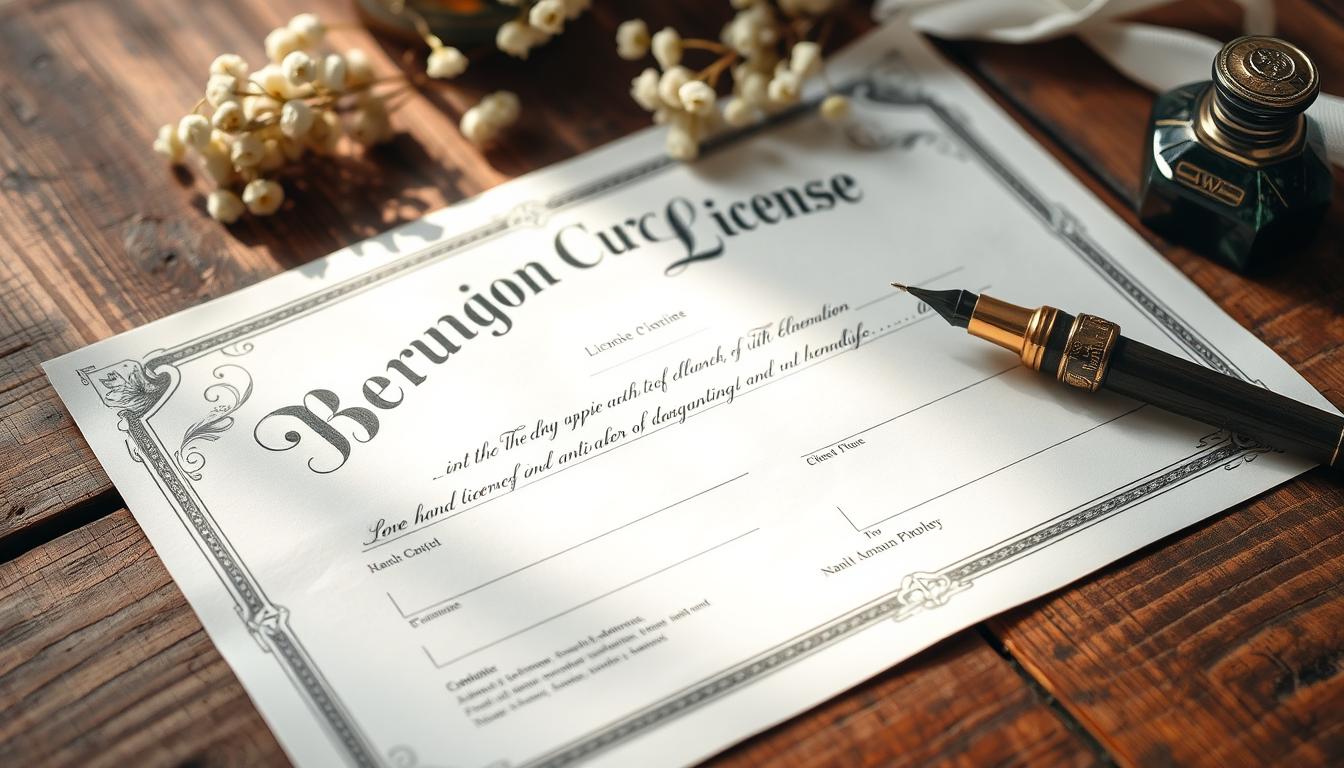Legal Requirements for Your Wedding: A Complete Guide
November 12, 2024
Melody Mburu
Planning your dream wedding is exciting, but you must also understand the legal side. This guide helps you with the legal steps for your wedding in the United States. It covers marriage licenses, officiants, and other important details to make your day both joyful and legally valid.
Key Takeaways
- Learn the basics of getting a marriage license, like what documents you need, how long it's good for, and how to pay.
- Know who can legally marry you in your state.
- Find out about legal issues for special cases, like same-sex marriages or weddings for minors.
- Make sure your wedding officiant has the right qualifications.
- Keep up with the latest legal changes in your area.
Understanding Marriage License Basics
Getting a marriage license is a key step in the marriage process. The rules for getting a license differ by state. But, there are some common things you should know. We'll look at what you need for a license, how long it's good for, waiting times, and costs.
Required Documentation for License Application
To get a marriage license, you and your partner need a valid photo ID. This can be a driver's license or passport. Some places also ask for proof of age and where you live. Make sure to check what you need in the state where you're getting married.
Validity Periods and Waiting Times
Marriage licenses are only good for a short time, from 30 to 90 days. There's also a waiting period before you can get married. This waiting time can be a few hours or several days. So, plan ahead.
Cost and Payment Methods
The price of a marriage license varies, from $30 to $100. You can pay with cash, cards, or checks. Check with the place where you're getting your license to see what they accept.
"Remember, the requirements for a marriage license can change, so it's essential to research the specific laws and regulations in the state where you plan to get married."
What legal requirements do we need to fulfill for our wedding?
Starting your marriage journey means knowing the legal steps ahead. You'll need a marriage license and might face extra steps, like handling previous divorces or name changes. These steps are key to making your wedding official.
First, you must apply for a marriage license in the state where you'll get married. You'll need to give personal info, proof of who you are, and sometimes proof of past divorces. The rules and costs for a marriage license vary by state, so check your local legal requirements for wedding carefully.
If you or your partner have been married before, you'll need to show your divorce decrees at the marriage license office. This makes sure your new marriage is recognized and there are no legal issues from past marriages.
Also, think about name changes that might happen because of your marriage. You might need to update your driver's license, social security card, and other important documents to match your new name. Plan ahead and know the time frames for these changes.
By knowing and following these legal requirements for wedding, you can make your marriage transition smooth. Always check with local authorities and legal experts to make sure you're ready for your big day.
Selecting and Qualifying Your Wedding Officiant
Choosing your wedding officiant is very important. They make sure your ceremony is legal and recognized by the state. You can pick from many options, like state-recognized religious officials, civil servants, or judges.
State-Recognized Religious Officials
If you want a religious ceremony, pick an officiant recognized by the state. This includes ordained ministers, pastors, rabbis, imams, and more. They must meet state requirements, like being part of a recognized religious group.
Civil Officiants and Judges
For a non-religious ceremony, choose a civil officiant. This could be a county clerk or a judge. They are allowed by the state to perform legal marriages and handle the paperwork.
Online Ordination Requirements
Online ordination is another option. But, make sure the state where you're getting married recognizes it. Some states have special rules for online-ordained officiants. Always check the legal requirements for your wedding first.
It doesn't matter who you choose as your officiant. Just make sure they meet all legal requirements. This way, your marriage will be legally valid and recognized by the state.

Legal Considerations for Special Circumstances
When planning your wedding, think about any special legal issues. This includes prenuptial agreements, previous marriages, and name changes. Addressing these early ensures your wedding is legally valid.
Prenuptial agreements outline how assets will be divided if you divorce. It's key to have a lawyer review it to make sure it follows your state's laws. This can protect your finances if your marriage ends.
If you or your partner have been married before, you'll need to show divorce decrees. This proves your previous marriages are over. You might also need to change your name, which has different rules in each state.






















